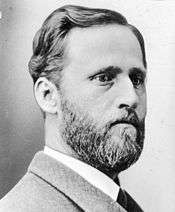Joseph Angell Young
Joseph Angell Young (October 14, 1834 – August 5, 1875) was an apostle of The Church of Jesus Christ of Latter-day Saints (LDS Church). Young is one of the few Latter-day Saints in history to have been ordained to the office of apostle without ever becoming a member of the Quorum of the Twelve Apostles or the First Presidency of the church.[3]
| Joseph Angell Young | |
|---|---|
 | |
| LDS Church Apostle | |
| February 4, 1864 – August 5, 1875 | |
| Reason | Brigham Young's discretion[1] |
| Reorganization at end of term | None[2] |
| Personal details | |
| Born | Joseph Angell Young October 14, 1834 Kirtland, Ohio |
| Died | August 5, 1875 (aged 40) Manti, Utah Territory |
| Resting place | Mormon Pioneer Memorial 40°46′13.12″N 111°53′8.23″W |
Young was born in Kirtland, Ohio, the eldest child of Brigham Young and Mary Ann Angell. He was baptized into the church in Kirtland by his father at the age of eight. In 1847, Young travelled with his family and a group of Mormon pioneers from Nauvoo, Illinois to the Salt Lake Valley.
Young was a missionary for the LDS Church in England from 1854 to 1856, working in Liverpool, Manchester, and Bradford. Upon his return to Utah Territory, Young married Margaret Whitehead, a native of England. She became his second wife.
Over the next few years Young was involved in the lumber industry, running several saw mills in canyons by Salt Lake City. He was also one of the main promoters of the Utah Central Railroad.[4]
In 1864, Brigham Young privately ordained two of his sons—Brigham Young, Jr. and Joseph Angell—to the priesthood office of apostle, without a public announcement or adding them to the Quorum of the Twelve Apostles.[1] Brigham had also previously ordained his son John Willard Young an apostle in 1855. Unlike his two brothers, Joseph Angell would never become a member of the First Presidency nor, like Brigham Jr., a member of the Quorum of the Twelve Apostles. Joseph Angell was active in territorial politics and was a member of the Utah Territory's House of Representatives in its 6th, 11th, and 12th sessions and was a member of the territory's upper chamber in its 14th through 19th sessions.
In 1872, Young was called to preside over the Sevier District of the church in present-day central Utah. He became the first stake president of the Sevier Stake when it was organized in 1874. Young served only a few months before dying unexpectedly in Manti, Utah Territory at the age of forty. At the time he was working on plan specifications for the Manti Utah Temple.[6] He was buried in the Brigham Young Cemetery in Salt Lake City.
Young is the father of Richard Whitehead Young, who was an Associate Justice of the U.S. Territory of the Philippines Supreme Court between 1899 and 1901.
Notes
- Todd Compton (Winter 2002). "John Willard Young, Brigham Young, and the Development of Presidential Succession in the LDS Church" (PDF). Dialogue: A Journal of Mormon Thought. 35 (4): 111–12. Retrieved 2014-12-09.
- Since Young was not a member of the Quorum of the Twelve Apostles or the First Presidency, no one was called to the apostleship as a replacement after he died.
- David Whitmer was an ordained apostle but was never a member of either quorum. Some have also suggested that Martin Harris was an ordained apostle. See Brigham Young, Journal of Discourses 6:320 and Heber C. Kimball, Journal of Discourses 6:29.
- Andrew Jenson, Latter-day Saints Biographical Encyclopedia vol. 1, pp. 518–19.
- Young, Brigham, and Everett L. Cooley. Diary of Brigham Young, 1857. Tanner Trust Fund, University of Utah Library, 1980 found online at:https://collections.lib.utah.edu/details?id=328944
- thesis on the life of Richard W. Young
References
- Jenson, Andrew. Latter-day Saints Biographical Encyclopedia. vol. 1. Salt Lake City: Andrew Jenson History Company, 1901.
- Warnock, Irvin, and Lexia Warnock, eds. Our Own Sevier. Richfield, Utah: Sevier County Commissioners, 1965.
- Young, Brigham. Letters of Brigham Young to His Sons. Edited and with an introduction by Dean C. Jessee. Salt Lake City: Deseret Book, 1974.